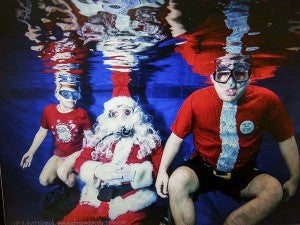Area 29 encourages volunteers, athletes to join
Published 2:42 pm Thursday, July 24, 2014

Wearing green T-shirts, the Smiths of Franklin come out of the water after the Polar Plunge this past February. The event is a fundraiser that goes toward Virginia Special Olympics, with a percentage going back to Area 29 athletes. — SUBMITTED
FRANKLIN—Area 29 Special Olympics is important to a lot of people for many reasons. While ultimately children and adults with intellectual disabilities do compete for medals, that’s not really what it is about.

These are members of the Area 29 Special Olympics swim team at the Virginia Military Institute this year. Jorden Jarratt and Ethan Smith are in T-shirts. — SUBMITTED
Pat Smith and her son Ethan, of Franklin, joined in 2004. Ethan, who has autism, didn’t have any activities that he could participate in locally. After reading an article in The Suffolk Sun about the then Suffolk-based Special Olympics group, Pat called them, and as they say, “The rest is history.”
“It gives him an outlet for socialization and a place to compete that he wouldn’t have without Special Olympics,” she said. “I was excited to have something come along that Ethan was able to participate in. Not only for the exercise but also for the socialization. He has opened up socially with the other athletes and has learned some independent living skills while staying in hotels when we travel.”

Kelsey Byrd, left, and Ethan Smith of Franklin suba dive with Santa Claus as a fundraiser for Area 29 Special Olympics. Smith had joined the organization in 2004. — SUBMITTED
Just this year, Ethan’s friend Jorden Jarratt of Capron joined. The pair had once gone to school together.
“It’s wonderful to watch new athletes come in and see everybody welcome them into our area and become friends and companions,” Smith said.
The organization provides sporting events that go year round, and it seeks to give continuing opportunities for the athletes to develop physical fitness, demonstrate courage, experience joy and participate in the sharing of gifts, skills and friendships with the families, other Special Olympic athletes and also out in the community.
This all started about 10 years ago when Amy and Michael Clark of Suffolk moved to town and wanted to start a community-based Special Olympics program. At the time, the only students being served were those in the Lakeland High School program.
It began with a swim program at the Suffolk YMCA, and has since been expanded to include bowling, volleyball, soccer, tennis, golf, basketball, track and field, power lifting, bocce and softball.
Approximately 100 athletes are served, the majority of which reside with their families in the cities of Suffolk and Franklin, along with the towns of Capron and Ivor. The Zuni Presbyterian Home, which provides facilitated care for adults with intellectual disabilities, also participates.
In Special Olympics, success and outcomes are not measured by wins and losses. More so, the goal of Special Olympics is to help bring all persons with intellectual disabilities into the larger society under conditions whereby they are accepted, respected and given the chance to become productive citizens. Any person from age 8 and older with intellectual disabilities can become a Special Olympic athlete. There is no cost to the athlete to participate. All potential athletes must have an athlete participation form completed by their physician.
The Special Olympics athletes’ oath is “Let me win. If I cannot win, let me be brave in the attempt.”
Athletes participate in local competitions in order to advance to state competitions. Funding is not required for local competitions but is required for overnight state competitions. Expenses are paid by Area 29. All money used to pay for travel, accommodations, sport equipment, meals, etc. is raised by volunteers, coaches and parents of Area 29. Area 29 tries to have several fundraisers yearly to help raise funds.
The biggest area fundraiser is the Polar Plunge in Virginia Beach in February. Each plunger has to raise $100 for the privilege to dive into the icy-cold Atlantic. Ethan and his family and friends have participated in the plunge every year since he’s joined Special Olympics.
There is also Scuba Santa. Chesapeake Bay Dive Center owners and divers, including Ethan’s dad Barry, donate their time and provide this opportunity for people of all ages to have their picture taken underwater with Santa.
Recently, they also worked with the Three Rivers Bass Tournament Series for a fundraiser.
“We work hard year round to collect donations so we can provide as many opportunities for the athletes as we can,” Smith said.
Special Olympics has seasonal sports. The spring and summer season begins in January and runs through June. Those sports are swimming, bowling, tennis and bocce. The fall season begins in September and runs through November.
Those sports are volleyball, golf and bocce.
Anyone interested in participating as an athlete or volunteer can contact Pat Smith at ppsmiths@yahoo.com or 630-8919.
“We want to get the word out and let people know what opportunities are there for other individuals with intellectual disabilities,” Smith said.

